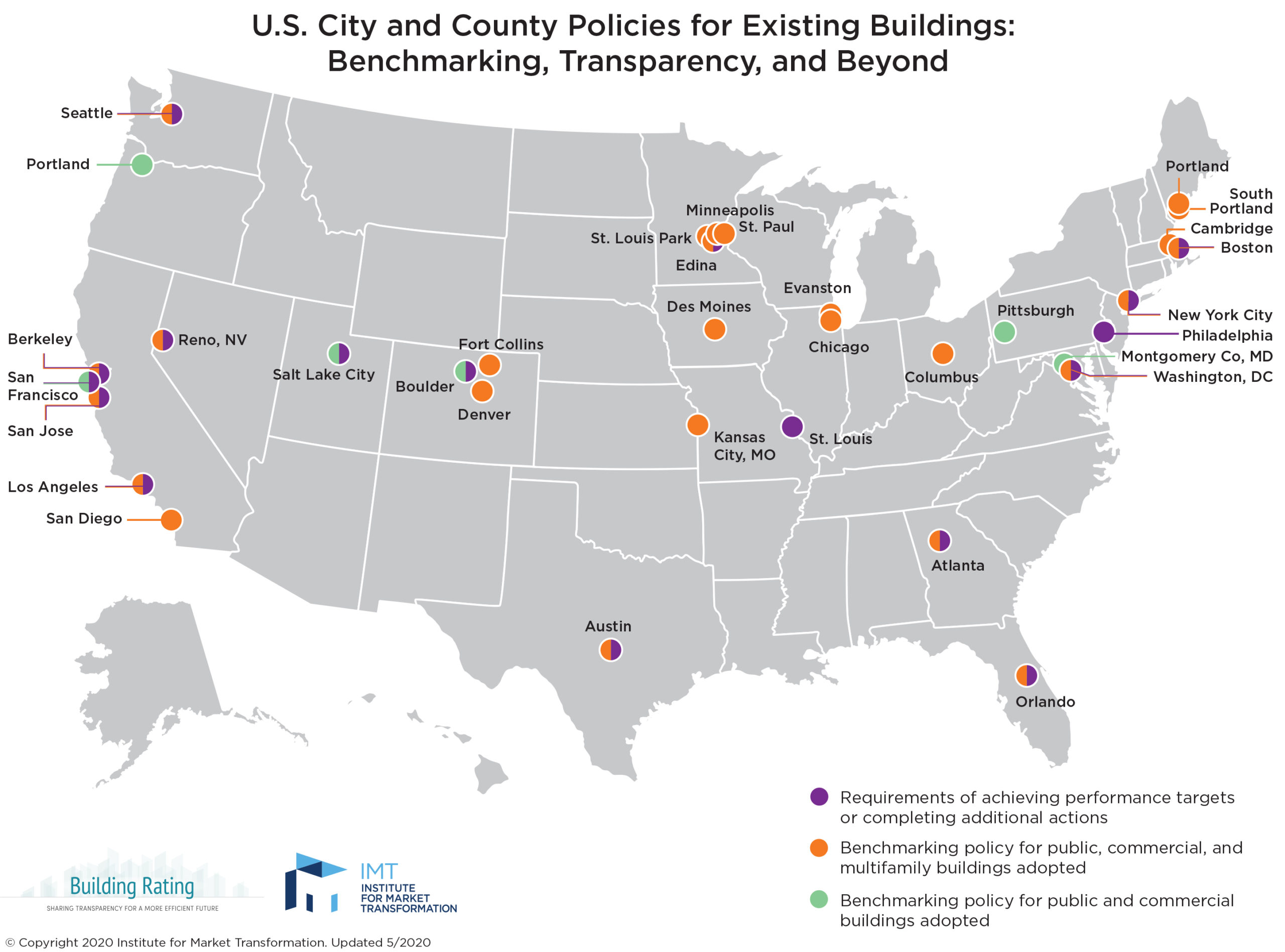California’s energy efficiency action plan for existing buildings is ramping up in 2021. We are offering this guide to help identify what your city’s climate policy is and what the requirements are for existing commercial and residential buildings. Included are some tips for making the most of your efficiency compliance.
Why Existing Buildings?
Existing buildings are the second-largest source of GHG emissions in California. Identifying energy and water waste in our buildings provides valuable insight for policymakers. The chosen method of identifying is through local and state-mandated Energy Benchmarking and Performance Reporting. Benchmarking is the comparison of a site’s energy performance to similar type and use buildings over a specified period of time. ENERGY STARⓇ Portfolio Manager is the approved tool used to complete and submit benchmarking reports for compliance. Here are a few overall notes on meeting energy disclosure requirements:
- The owner of the building is the responsible party
- These benchmarking laws are required annually
- “Covered or disclosable buildings” are the building types that need to comply. Exceptions exist and vary per ordinance so be sure to check with your individual city’s program or contact us for program requirements
- When you comply with your local benchmarking ordinances, the city shares the data with the state, placing you in AB 802 compliance as well
- Benchmarking provides insight into how efficient or inefficient your building is operating. Efficient buildings provide for lower operating costs and higher market valuations
- Funding: there are available rebates and incentives through your utilities and in some places, local funding for compliance and energy efficiency projects. Most ordinance pages have links to these programs. Also check your electric, gas, and water company webpages for info, or contact us
- The State of California and the City of San Diego only require annual energy disclosure. However, some cities also require buildings to become energy efficient or show their performance by meeting Energy Star Certification requirements
5 Tips for Compliance & Becoming a High-Performing Building
- Hire Green EconoME to complete your compliance and energy efficiency consulting. We understand that you have benchmarking service provider options; however, from our experience benchmarking over 1,600 buildings properly, not all benchmarking is the same. We place emphasis on accurately measuring your data, rather than meeting the bare minimum for compliance. It is not only the legal thing to do, it is also more economic in the long run. The data in your benchmarking report is valuable to the operation and investment of your property, and the basis of your performance reporting. If corners are cut, you may end up paying more in unnecessary (and costly) audits or having to rehire another firm to correct the work.
- Add tenant authorization to your lease to release energy and water use data from the utilities. In some cases where the tenants are the electric/gas/water account holder, they are required to sign an authorization to share their usage data. As you can imagine, this is time consuming and not always successful. In lieu of the authorization, we can submit a copy of the lease if it includes authorization language.
- Create an energy efficiency budget. The Better Buildings Financing Navigator is a great resource which outlines common barriers, solutions and considerations to energy financing. These ordinances are all-for-none if building owners and operators do not invest in the goal of achieving more energy and water efficient buildings by 2030. Visit our case studies for examples of the cost to savings you can achieve through efficiency projects.
- Leverage available rebates and incentives. In addition to outside funding and loans, there are robust programs for energy efficiency and clean power through utilities, local and federal government. Word on the street is that further funding (and further policy) will be proposed soon after the new administration takes office. Green EconoME calculates available rebates & incentives savings into our estimates and/or audit reports.
- Put your data to work. Use monthly data to track your energy & water use in ENERGY STAR Portfolio Manager. Demonstrating energy and water reductions through the benchmarking tool in some cities is a path to performance compliance. Either way, you now have a powerful tool that tracks your ongoing use, so take advantage of it. Green EconoME offers consultations to assess your building’s performance and identify problem areas or opportunities for savings.
Our hope is that the purpose of the requirements is clear and can inspire long term efficiency in your buildings. Our city and state leadership also recognize this can come as a big ask, and so they are supporting owners and communities through funding programs. Take advantage of them. Most importantly, existing buildings are recognized across the globe as a vital part of the solution. That is a big opportunity when you throw your hat in the ring. Good luck and call us if you need us. We cannot wait to see what California buildings can do.
Benchmarking and Performance Reporting
Statewide Program
State Policy: Clean Energy and Pollution Reduction Act – SB 350
Benchmarking Report: Due by June 1, annually
Performance Report: N/A
Fees: N/A
Program Summary: Commercial buildings with more than 50,000 sq. ft. and no residential utility accounts, and multifamily residential buildings with more than 50,000 sq. ft. and 17 or more utility accounts must submit whole-building energy benchmarking reports annually.
Enforcement: Per Public Resource Code #25321, the California Energy Commission is able to enforce this law. This code states:¨If after five working days, the owner does not comply, the owner will be subject to a civil penalty (after a hearing that complies with constitutional requirements. Civil Penalty will not be less than $500 nor more than $2,000 for each category of data for each day the violation existed and continues to exist.”
Bay Area Programs By City
Local Policy: Climate Smart San Jose
Benchmarking Report: Due by May 1, annually
Performance Report: Due every five years based on building size and last digit of APN
Fees: $150 annual benchmarking reporting fee
Program Summary: Commercial and multifamily buildings 20,000 square feet and over required to submit the whole building energy and water benchmarking report annually to the City. Starting in 2021, buildings must submit a report demonstrating high-performance or efforts toward reducing energy and water use. See program details and schedule for performance compliance here.
Enforcement: “It is unlawful to violate any provision or to fail to comply. Each and every violation shall constitute a separate violation each day for ongoing violations and shall be subject to the remedies and enforcement measures authorized by the Code.”
Local Policy: San Francisco Climate Action Plan
Benchmarking Report: Due annually on April 1*
Performance Report: Required every 5 years for nonresidential buildings
- Buildings 50,000 square feet and larger: ASHRAE Level II audit
- Buildings 10,000 to 49,999 square feet: ASHRAE Level I audit
Fees: N/A
Program Summary: Existing non-residential buildings with 10,000 square feet or more of space that is heated or cooled and existing multifamily residential buildings with 50,000 square feet or more of space that is heated or cooled. The Ordinance has two separate requirements: whole building energy benchmarking and energy audits.
Enforcement: “Fine can be levied 45 days after the written notice of violation. Buildings of 25,000 sq.ft. and larger can be subject to fines of $100 per day, up to a maximum of $2,500 per violation. Buildings smaller than 25,000 sq.ft. can be subject to fines of $50 per day, up to a maximum of $1,500 per violation.”
Local Policy: Berkeley Climate Action Plan
Benchmarking Report: Due by July 1, annually for buildings 25,000 sq. ft and above. Buildings 15,000 sq. ft and above will be required to comply beginning July 1, 2022.
Performance Report: Assessment is due every five-years for buildings over 25,000 sq.ft., and time of listing for buildings under 25,000 sq. ft.
Fees: No benchmarking fees. $240 energy assessment filing fee for large buildings over 25,000 sq. ft. See table for a time of sale assessment filing fees.
Program Summary: Commercial and residential buildings below 15,000 sq. ft. are required to complete and submit an energy assessment at the time of sale. Assessments must be completed by registered assessors/auditors. Buildings 15,000 sq.ft. and above must submit benchmarking reports annually, in addition to their assessment requirement. See table:

Enforcement: “Any person who violates the Ordinance may be subject to a fine of $100 for each violation, and an additional fine of up to $25 for each day that the violation continues, up to a maximum of $1,000 per violation.”
Southern California Programs By City
Local Policy: Los Angeles’ Green New Deal
Benchmarking Report: Due by June 1, annually
Performance Report: Due by December 1, every five-years based on the last digit of your LADBS Building ID
Fees: LADBS registration fee + surcharge for benchmarking is $66.41 / building / year, and $183 per audit/RCx confirmation submittal.
Program Summary: Buildings 20,000 sq ft or more in gross floor area privately owned or owned by a local agency of the State in the City of Los Angeles must report energy and water use annually, and a performance report every five years, based on qualifying performance metrics or prescribed efficiency measures outlined in the ordinance. Head to our EBEWE page for further program details.
Enforcement: Program non-compliance fee of $202 / building, plus disruption to LADBS permitting requests, or transactions. This fee is subject to double digit interest each month.
Local Policy: The City of San Diego Climate Action Plan (CAP)
Benchmarking Report: Due by June 1, annually
Performance Report: N/A
Fees: N/A
Program Summary: Commercial buildings over 50,000 square feet and multifamily and mixed-use buildings greater than 50,000 square feet and with 17 or more residential accounts in the City of San Diego are required to submit whole-building energy data (water not required).
Enforcement: Violations may be prosecuted as misdemeanors subject to the fines and custody provided in San Diego Municipal Code. Additionally, the Department Director may seek injunctive relief and civil penalties in the Superior Court pursuant to San Diego Municipal Code.




